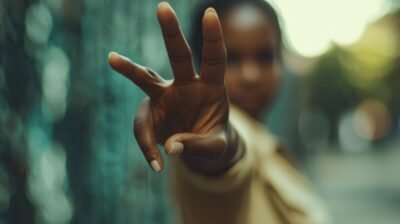In many Black families, eldest daughters are celebrated as leaders, protectors, and role models. But behind that honor often lies a heavy, unspoken

In many Black families, eldest daughters are celebrated as leaders, protectors, and role models. But behind that honor often lies a heavy, unspoken truth: eldest daughters are expected to carry more than any child should. These expectations can build resilience and wisdom—but they can also create vulnerabilities to violence, abuse, and deep emotional wounds that are too often overlooked.
Here are some of the unique pressures eldest daughters face, and why they deserve both recognition and protection:
1. Caretaking Beyond Their Years
Eldest daughters are often expected to care for younger siblings, sometimes in very adult ways—feeding, bathing, helping with homework, or even managing household budgets.
This role is sometimes so normalized that people fail to recognize when a child is being overburdened or robbed of her own childhood.
That expectation can make her silence her own needs, believing her worth comes from “holding it all together.”
2. “The Strong Black Girl” Archetype
Society already places the “Strong Black Woman” stereotype onto adult women. For eldest daughters, this stereotype often begins in childhood.
They may be told they’re “mature for their age,” praised for toughness, or discouraged from crying. This leaves them vulnerable to abuse because others assume they don’t need as much protection.
3. Emotional Labor and Secrets
They are often expected to absorb adult pain—listening to parents vent, covering for a struggling caregiver, or holding family secrets.
This unspoken responsibility makes them vulnerable to coercion, silencing, and abuse, since they’re conditioned to put the family’s needs above their own safety.
4. Protectors of Brothers and Fathers
In some households, eldest daughters are tasked with protecting the reputations, comfort, or freedom of males in the family.
This can look like excusing violence, covering for harmful behavior, or being told to “keep the peace” at their own expense.
Such dynamics can make it dangerous for her to speak up about harm—especially harm done by men in the family.
5. Academic and Economic Pressures
Many eldest daughters are expected to “set the example,” excel in school, and sometimes contribute financially.
This pressure to perform creates vulnerability to exploitation in workplaces, relationships, or schools where predators sense their drive and responsibility but not their right to boundaries.
6. Replacing Mothers
In single-parent or struggling households, eldest daughters are sometimes expected to function as “second mothers.”
They may be the ones cooking, cleaning, supervising, or even emotionally parenting younger siblings.
This kind of parentification increases risk of burnout, exploitation, and abuse, especially when outsiders see her as older than she is.
7. Silence as Duty
Eldest daughters may be told explicitly or implicitly not to complain—because “your siblings are watching,” or “we need you to be strong.”
This trains silence, which predators and abusers exploit.
✨ The Vulnerability Layer
These expectations cultivate deep love and resilience—but they also normalize self-sacrifice, silence, and invisibility. That makes Black eldest daughters particularly vulnerable to:
Sexual abuse that goes unreported (because they feel they must protect others).
Domestic violence in adulthood (because they’ve been taught endurance is virtue).
Workplace exploitation (because over-functioning and over-achieving feels normal).
💜 Eldest daughters in the Black community often become pillars too early. Recognizing this isn’t about blame—it’s about protecting them with the care, freedom, and boundaries they are so often denied.